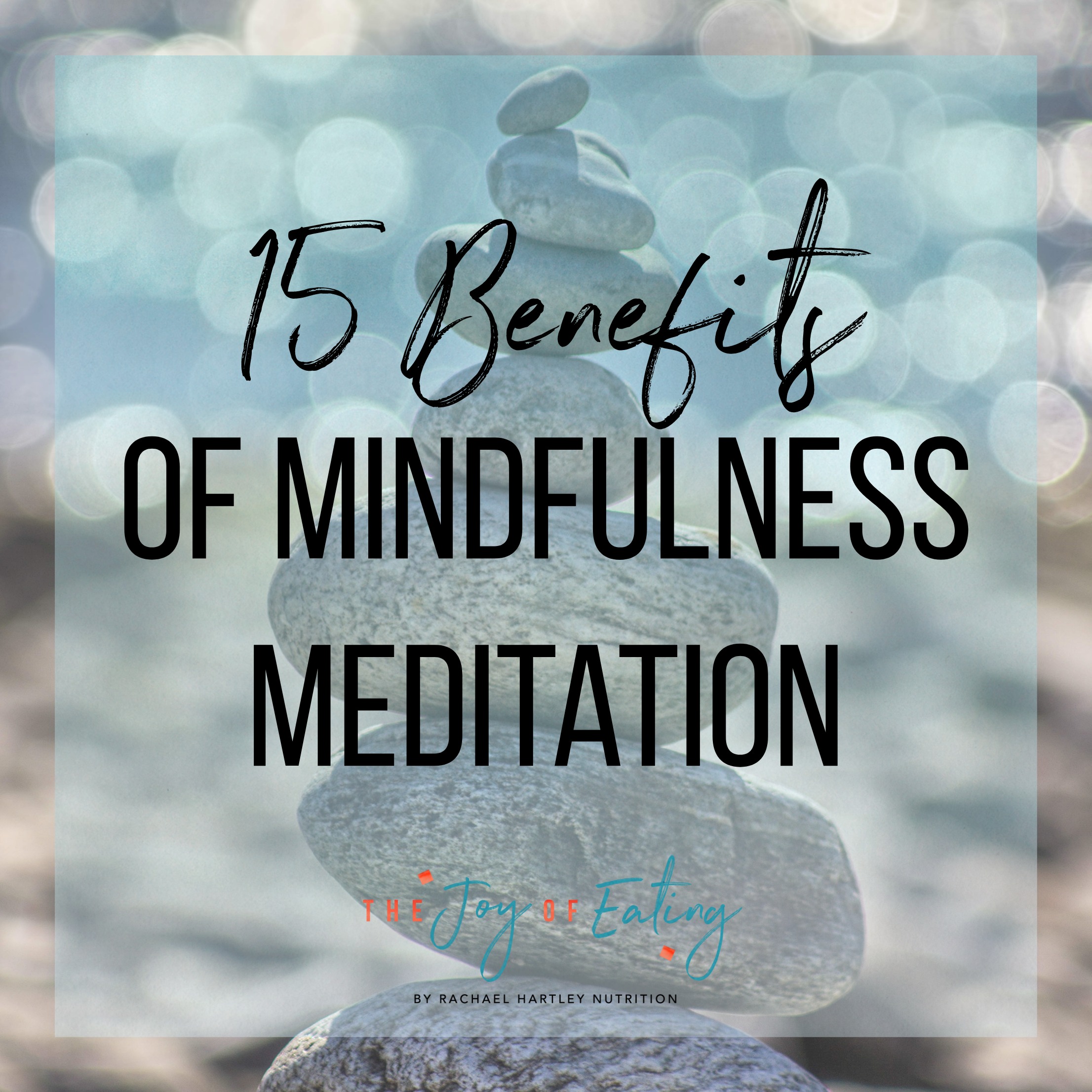15 Benefits of Mindfulness Meditation
Mindful meditation isn't quite mainstream, at least not yet. With hordes of research showing the benefits, I hope this is a trend that sticks. Learn 15 benefits of mindful meditation!
A couple weeks ago, I shared my current goal to make mindfulness meditation a regular morning habit. As soon as I hit publish, it hit me that some of you may not know what mindfulness meditation is, and likely had a pretty humorous picture of me sitting cross legged with crystals chanting "om."
When people first hear of mindfulness meditation, it sounds a little "woo." But in actuality, there's decades of research showing the benefits. And more recently, thanks to books like Eat, Pray, Love and 10% Happier, people like Depak Chopra and apps like Headspace, it's practically mainstream.
With heaps of research showing the benefits of meditation, it's a trend I hope sticks. And it's something I hope you'll incorporate into your healthy habits! Here's 15 reasons to start a mindfulness practice.
1. It lowers stress. The bulk of the research on mindfulness meditation is on the treatment of anxiety and stress relief. The anxious brain stresses about future events that haven't yet happened. Mindfulness meditation teaches your brain to be in the present moment and notice those distracting future projections without getting caught up in them. It also has been shown to lower the stress hormone cortisol.
2. Tuning in to hunger and fullness cues. Practicing mindfulness meditation fosters body awareness, making it easier to recognize hunger and fullness signals.
3. Personal development. Mindfulness meditation helps you better understand your authentic self by teaching you how to observe without judgement. Studies show it helps identify "blind spots," personality traits others see that we do not. Having insight into these "character flaws" sounds scary, but it lets you improve upon these areas without feeling shame.
4. Brain health. Mindfulness meditation literally changes the brain. It decreases grey matter concentration in areas of the brain that dictate stress response, and increases concentration in areas responsible for attention, memory and emotional regulation. It's also been shown to improve grades, memory, and even slows the progression of Alzheimer's disease.
5. Immune function. A meditation a day can keep the doctor away? Sure looks like it! Studies have found going through a mindfulness meditation course reduces inflammation, one of the root causes of chronic disease, and increases levels of the type of immune cell responsible for attacking invaders.
6. Food tastes better. One of my favorite benefits :) Mindfulness helps you slow down and fully taste and savor your food. You'll start to notice the sweetness of a carrot, the grassy floral flavor of good quality olive oil, and the buttery aroma of an avocado.
7. Improved social relationships. Feeling lonely? Mindfulness can help. It's been shown to foster stronger social connections by making you a better listener, allowing you to connect with others on a deeper level. And it's been my personal experience that people enjoy being with a calm, centered person rather than a neurotic, hot mess.
8. Improved sleep. Lack of sleep has a profound impact on health, something many people (myself included) often overlook. And yes, I notice the irony that I am typing this in bed, with a cup of coffee, trying to stay up late because I didn't get my writing done on time this week. But I digress. In one study, mindfulness meditation proved to be more effective than practicing general sleep hygiene habits, like avoiding alcohol and establishing a regular bedtime routine.
9. Chronic Pain. It may seem counterintuitive that mindfulness, or paying more attention, would be helpful if you're in chronic pain, but studies have shown it can reduce pain levels up to 60%. It's free, and doesn't come with the dangerous side effects of pain medications.
10. IBS and digestion. There are close ties between the brain and the gut. The gut has even been referred to as "the second brain." Mindful meditation has been shown to be an effective treatment for IBS.
11. Lowers blood pressure. With it's stress relieving abilities, this one makes perfect sense :)
12. Decreased inflammation. More and more, science is showing inflammation is the root cause of chronic diseases like diabetes, cancer and heart disease. Meditation has been shown to decrease inflammatory markers, making it useful in the prevention of chronic disease, as well as the treatment of inflammatory conditions like rheumatoid arthritis, asthma, and psoriasis.
13. Emotional & binge eating. Multiple studies have shown mindfulness meditation is an effective treatment for binge and emotional eating. It's helps you identify physical versus emotional hunger and helps you cope with negative emotions that often trigger binges.
14. Lowers blood sugar. Stress has a major impact on blood sugar levels, so much so that mindfulness meditation has been shown to be as effective as diet in reducing blood sugar levels.
15. Happiness & joy. Mindful meditation boosts happiness and joy in more ways than simply reducing stress. It helps you slow down and soak up the opportunity in every moment. We often look to external sources of happiness - a new job, a fancy car, approval from others - but the root of true joy stems from a deep sense of gratitude for each moment. Mindfulness lets you tap in to that.
On a personal level, incorporating mindfulness into my life had a profound impact on my attitude. After years (decades really) of living with anxiety, starting a mindfulness practice helped clear the fog that is chronic stress and allowed me to truly experience joy in the little things in life. It was life changing.
I didn't go away to an expensive meditation retreat or dedicate hours each day to the practice. It was simply by starting yoga, a type of moving mindful meditation, incorporating mindfulness into activities I was already doing, like cooking or walking the dogs, and the occasional guided meditation. Knowing the benefits of these little changes has inspired me to deepen my mindfulness practice by experimenting with different types of meditation and making it a morning habit.
Have you tried mindfulness meditation? What was your experience with it?






